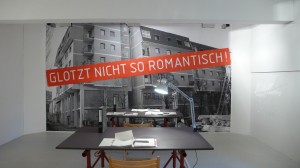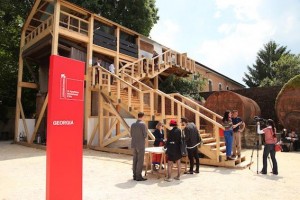Joanna Warsza and Dubravka Sekulić
FROM RUSSIAN TO GEORGIAN PAVILLION(S) Cross-presentation: Joanna Warsza and Dubravka Sekulić
Tuesady, October 1st, 19:00 @Galerija Nova, Teslina 7, Zagreb
Joanna Warsza and Dubravka Sekulić’s cross-presentation brings together two researches, both of which delve into the phenomenon of building extensions in a post-socialist context, in order to broaden the discourse around informal architecture beyond its romanticizing or barbarizing, and especially the treatment of this phenomenon in the art field. Joanna Warsza’s research started with a famous building which, in recent times, has become the symbol of the ‘strange’ Soviet times – the Former Ministry of the Highways of the Soviet Republic of Georgia, erected in 1975 by architects George Chakhava and Zurab Jalaghania – and tried to reveal the anticipatory potential of the heritage of Soviet architecture, manifested in its informal architecture: the extensions of modernist buildings, created since the 1990s as an organic response to the new, “lawless” times after the fall of the Soviet Union. In order to do so, she intertwined bottom-up solutions and the concept of self-organisation in art with architecture. The research was gathered in a guidebook, under the title Ministry of Highways. A Guide to the Performative Architecture of Tbilisi, which maps the social, urban and art discourses of the country’s post-Soviet years as seen from its hilly capital of Tbilisi. The publication accompanies the exhibition of the Georgian Pavilion at the 55th Venice Biennale – Kamikaze Loggia – curated by Joanna Warsza, which takes the form of this informal structure – characteristic of Tbilisi. By looking at local examples of self-initiated environments — e. g. kamikaze loggias, “euroremonts”, “beautifications” and other modifications of Soviet heritage — she sought to examine their anticipatory and often progressive potential. Dubravka Sekulić started her research with the enigmatic extensions of the so-called Russian Pavilions and continued to scrutinise the extra-territory between the illegal and the legal they belong to. Not only are the pavilions not Russian, but, more importantly, the act of their extension in the 2000s followed particularly shady negotiations between inhabitants, developers and municipal authorities, which placed the extensions beyond simple (il)legality. Glotzt Nicht so Romantisch! On Extralegal Space in Belgrade delves into the political and legal origins of this extra-territory, through which the housing policy of socialist Yugoslavia can be traced, during the 1990s, with property turning from “ours” into “mine”, and the 2000s, when the attitude of transgressing urban regulations became the norm, which explains much of the vast extra-legal urban interventions that shape the city today.
Joanna Warsza is a curator in the fields of visual and performing arts and architecture. She works mainly in the public realm, examining social and political agendas such as, from 2009 to 2010, the legacy of post-Soviet architecture in Caucasus, and, starting with the Public Movement in 2009, the phenomenon of the Israeli youth delegations in Poland. Her curatorial projects include the Georgian Pavilion, 55th Venice Biennale, Venice, 2013; the Göteborg Biennal, Göteborg, 2013 and, as associate curator, the 7th Berlin Biennale, Berlin, 2012. She is the editor of several books including: Ministry of Highways: A Guide to the Performative Architecture of Tbilisi (2013); Forget Fear(2012); and Stadium X-A the Place That Never Was (2009). Warsza lives and works in both Berlin and Warsaw.
Dubravka Sekulić is an architect and researcher focusing on the topics of the transformation of public domain in contemporary cities, commons and spatial justice, and the spatial implications of neoliberal planning. Her recent projects include the 2012 exhibition at the Museum of Contemporary Art in Belgrade, entitled Three Points of Support: Zoran Bojović, which deals with the link between Yugoslav modernism and the non-aligned countries, through focusing on Zoran Bojović and Energoprojekt’s projects in Africa and the Middle East. The Jan van Eyck Academie published her two books in 2012: Glotzt Nicht so Romantisch! On Extralegal Space in Belgrade, and Surfing the Black, about the Yugoslav black wave cinema, written in co-operation with Žiga Testen and Gal Kirn.

